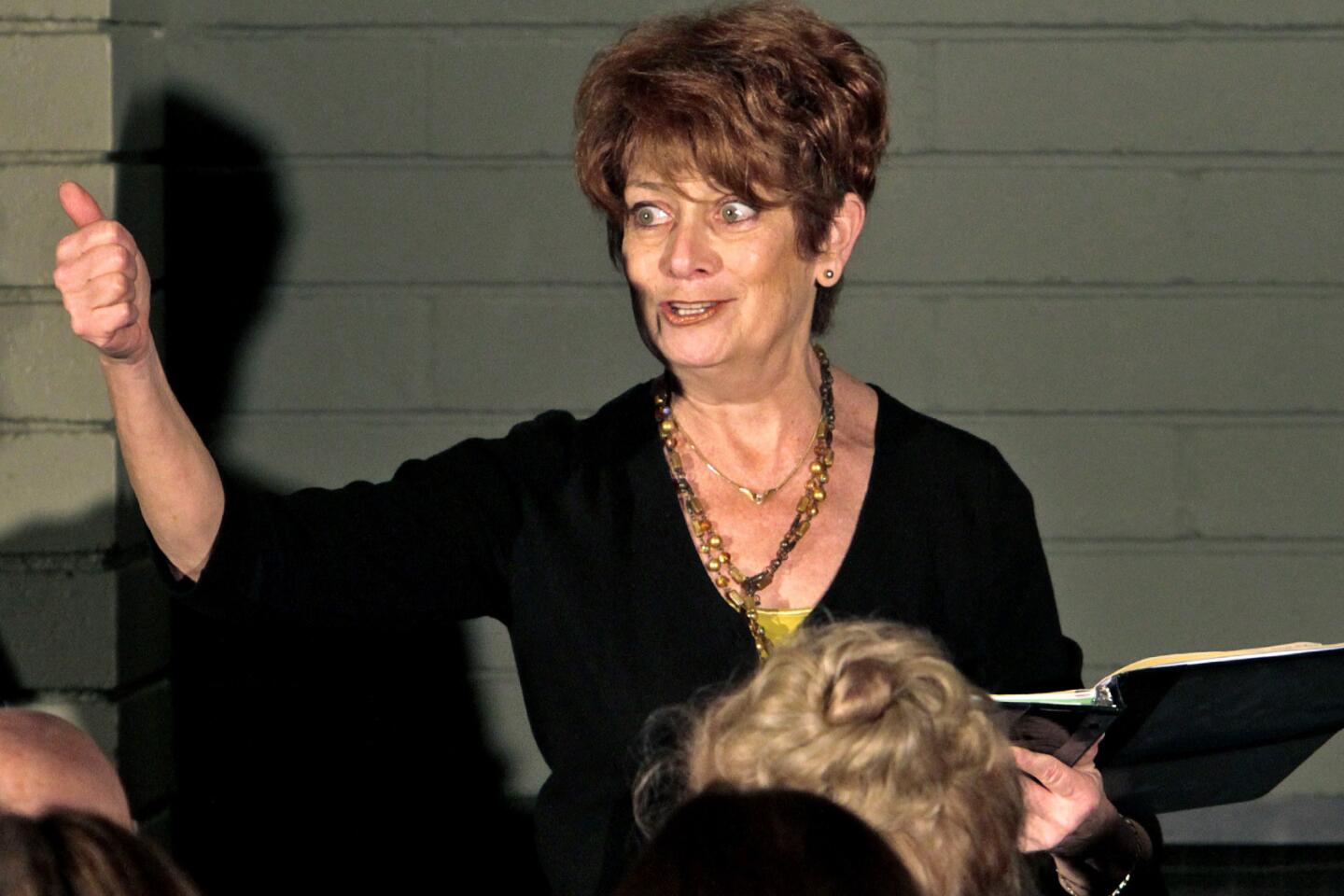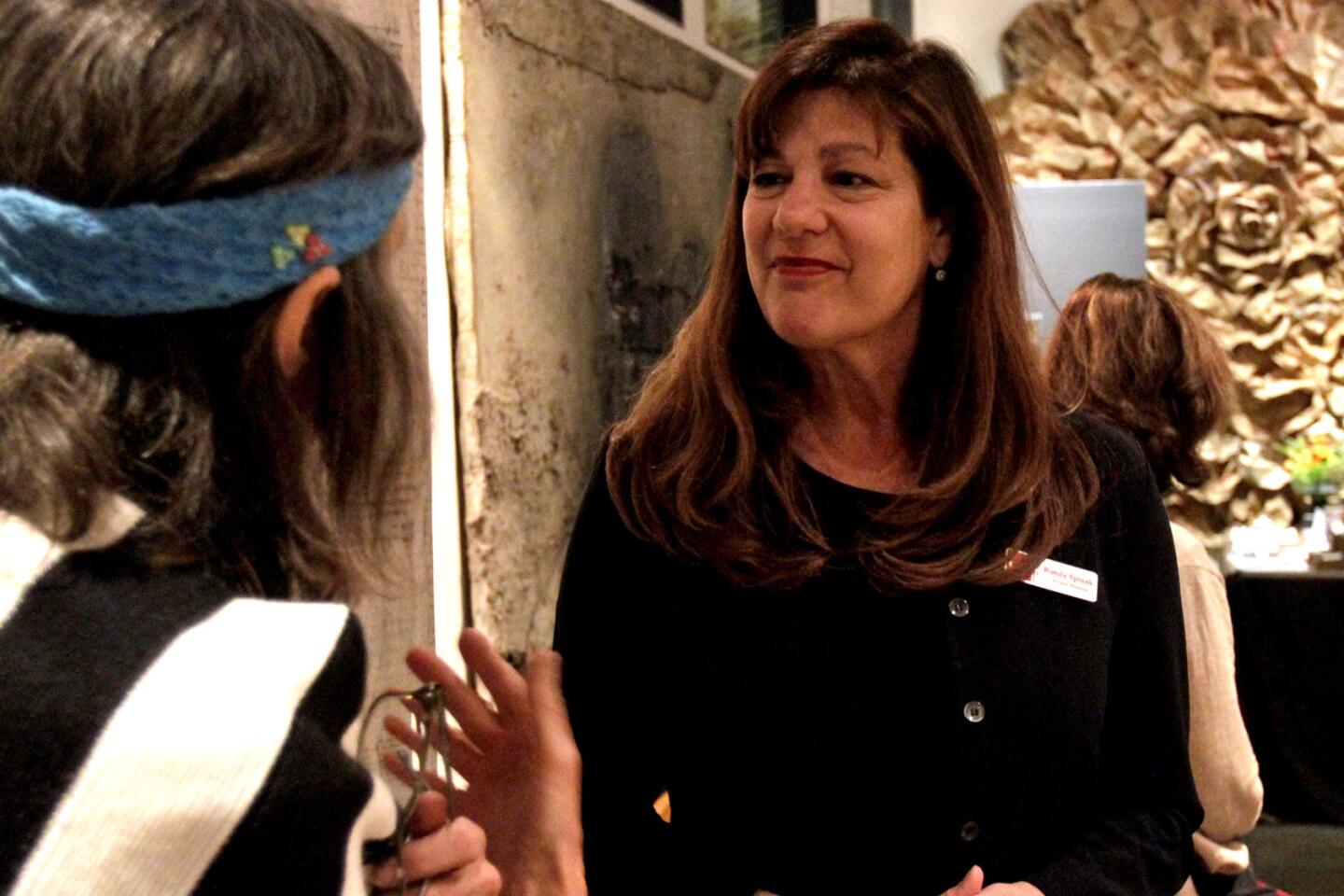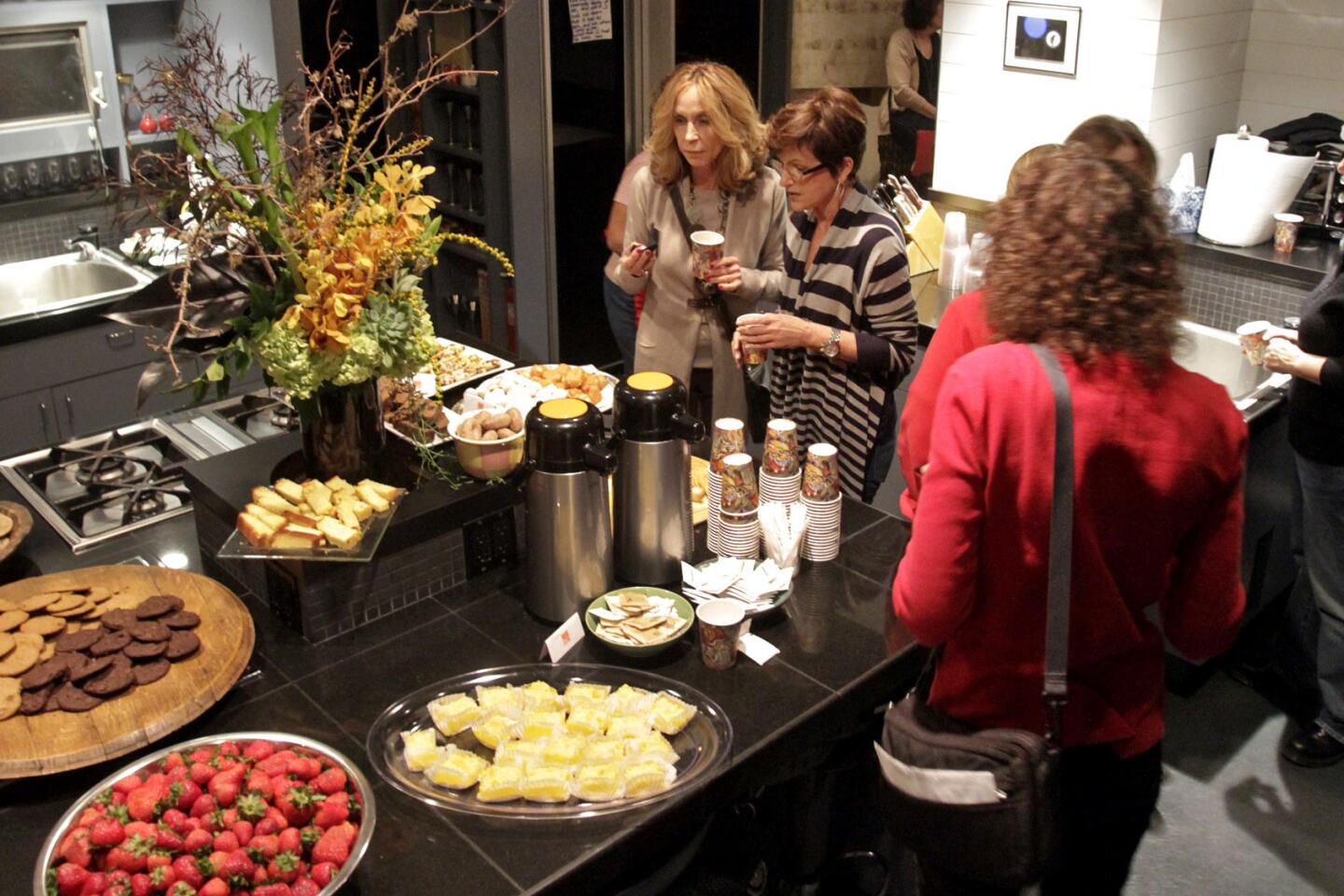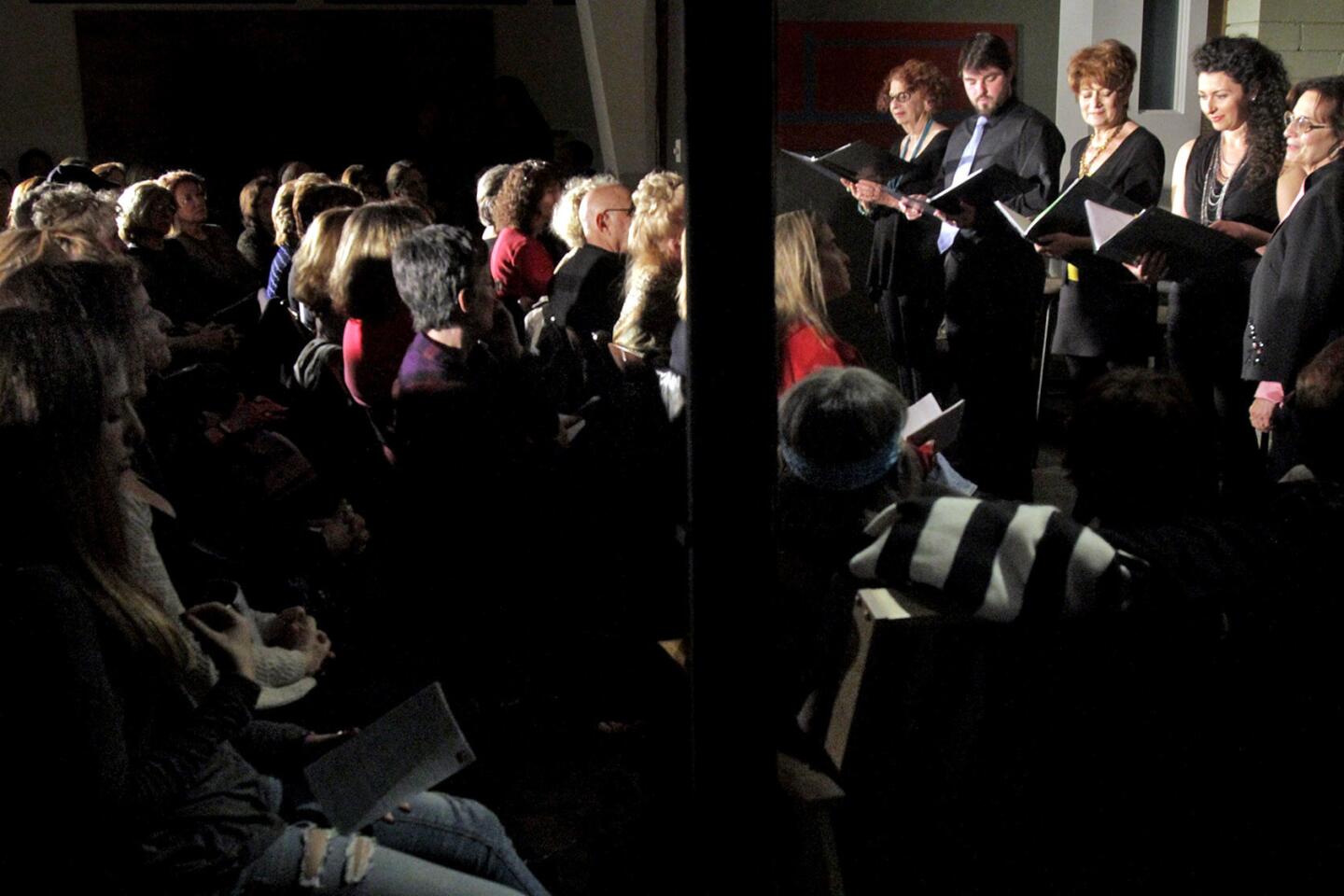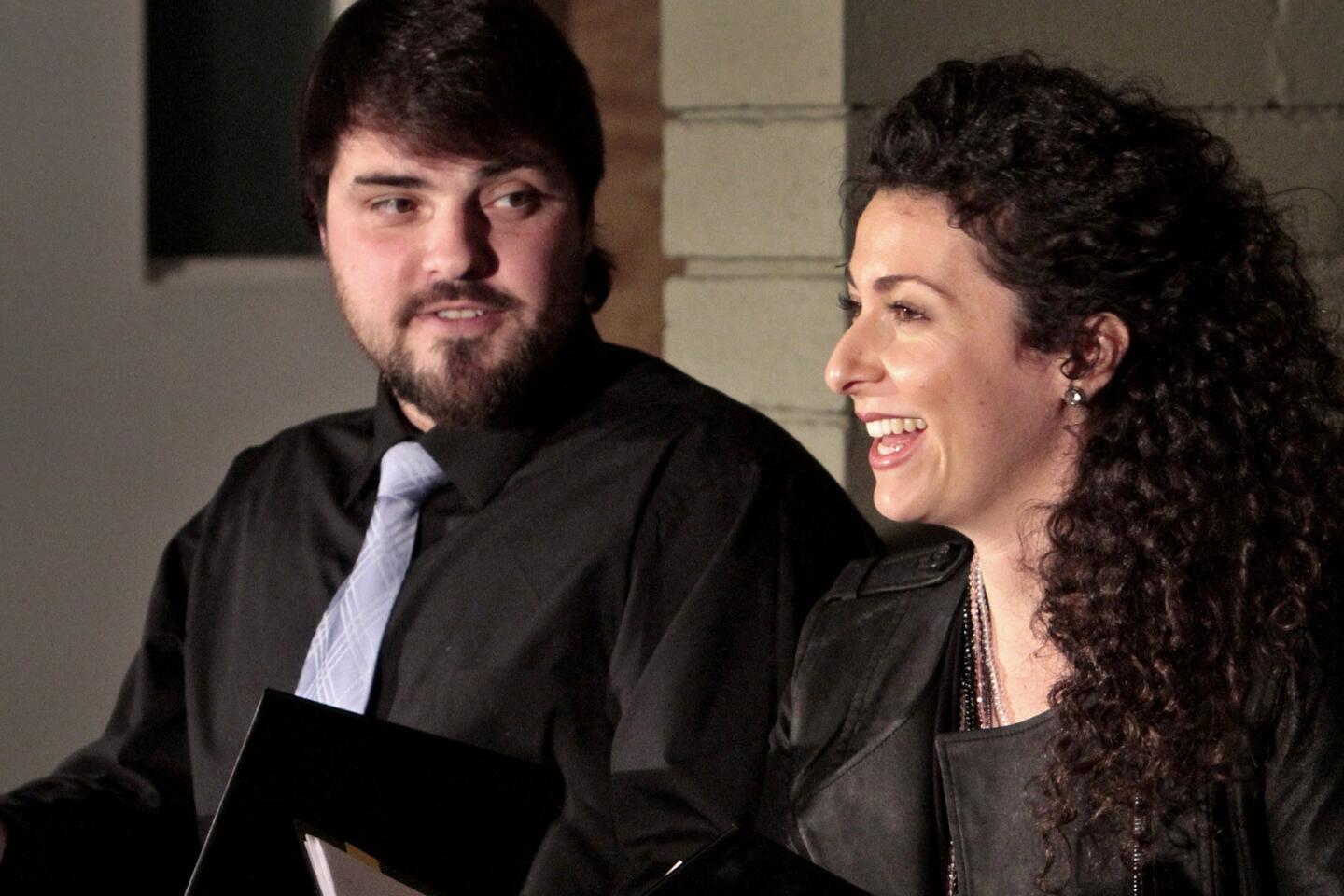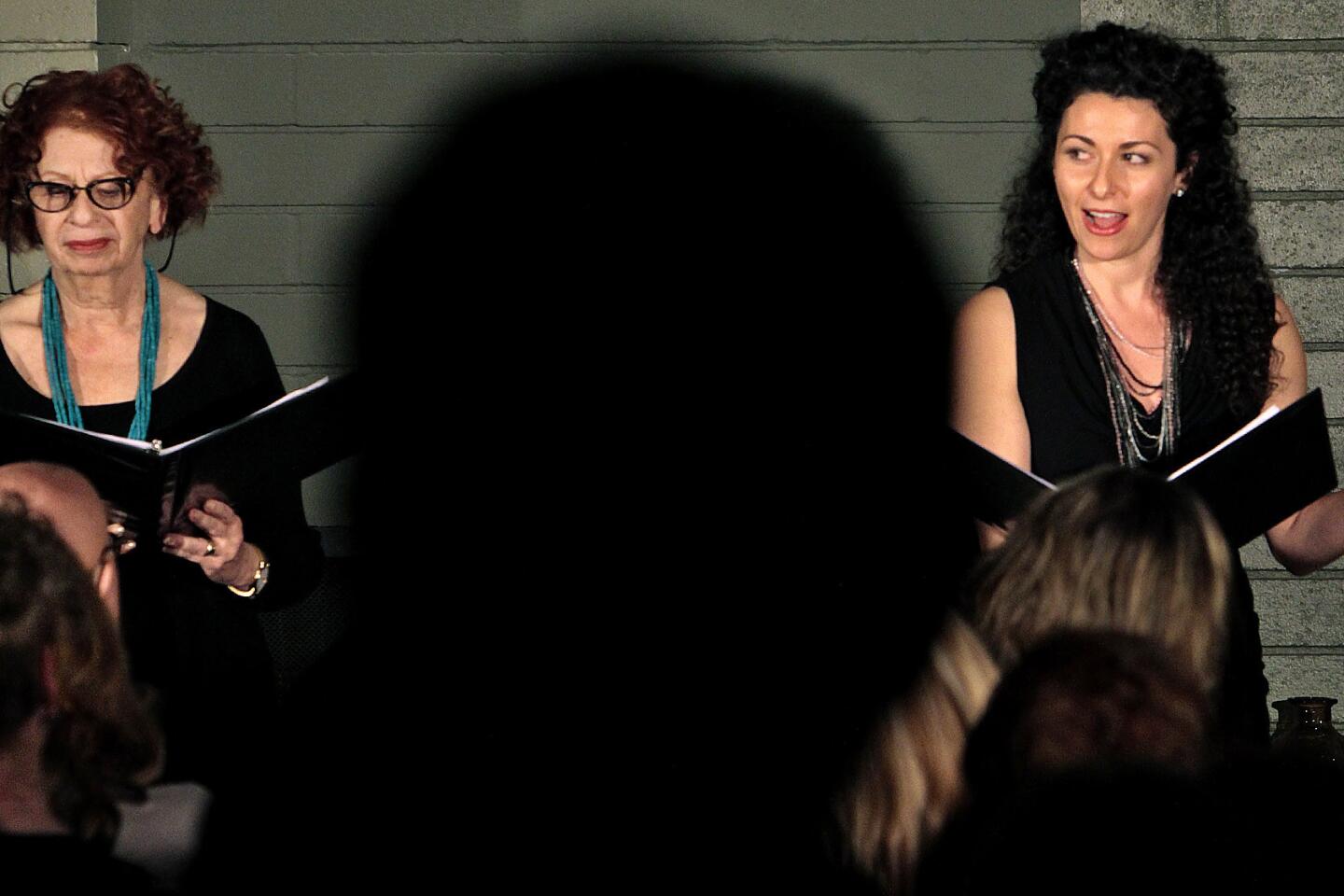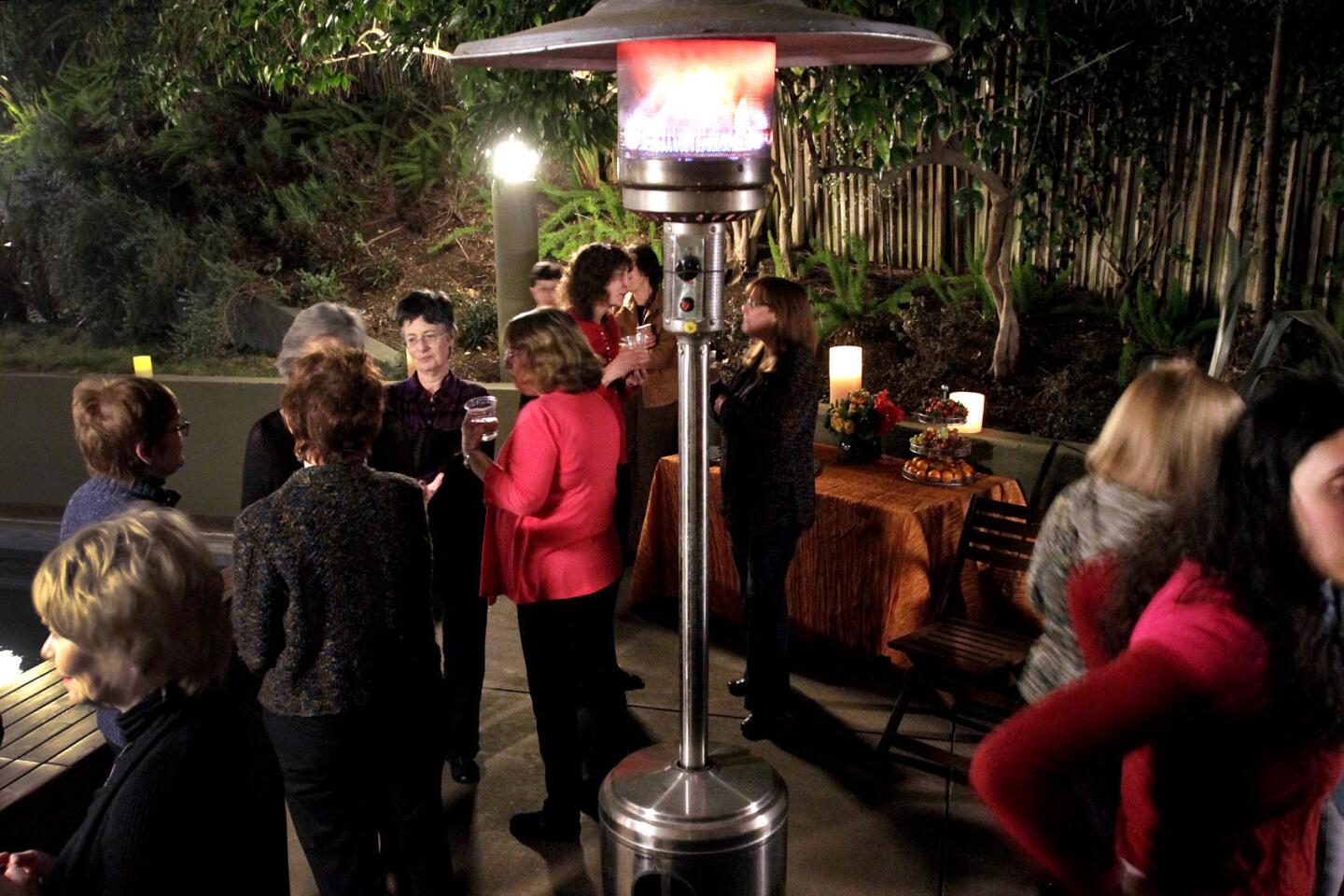Great Read: Theater troupe takes on Jewish female stereotypes
- Share via
Ronda Spinak squeezed more folding chairs into a Brentwood living room, which that afternoon had been transformed, with much shuffling of couches and tables, into a temporary theater.
Moving around the space, she listened for echoes and background noise.
Just past 7:30 p.m., she scurried to the patio and kitchen to shoo 70 theatergoers to their seats. Lights were dimmed. Five actors filed in and perched on stools in front of the brick fireplace.
Two spotlights beamed toward the makeshift stage, and the performers opened their black notebooks.
“I was, after all, a ‘60s girl,” read an actress portraying a spirited Jewish activist. “A ‘60s girl with emphasis on the late ‘60s. Plenty of marching and conviction. Plenty of khaki. Plenty of principles and ideals and outrage.”
She then told the improbable but true tale of how a friend went to absurd matchmaking lengths, fixing her up with a man confronting the imminent amputation of his left arm after a motorcycle accident.
When an actress playing the friend explained her motivation — “Trying to be nice, I guess. How could that hurt?” — the knowing audience cracked up.
In the annals of Jewish female stereotypes, there are the well-meaning but misguided romantic meddler, the guilt-inflicting Jewish mother, the spoiled Jewish American princess and the roly-poly bubbie — the Eastern European grandmother who is happiest in the kitchen.
Seven years ago, Spinak co-founded Jewish Women’s Theatre to challenge these and other widely held views, often negative, of Jewish females by performing their stories in homes, museums and synagogues.
“We’re presenting the Jewish woman in her diversity and changing perceptions of Jewish women in society,” said Spinak, also the nonprofit group’s artistic director, stagehand and usher. “We’re creating a legacy … and saying things that really do need to be said to the world and to each other.”
Every season, the troupe mounts three productions, each composed of several short sketches. The writers, including Spinak, tap into phenomena of the digital age (online dating for married people) and ancient texts (biblical stories reimagined from a modern woman’s point of view).
In a sketch from “Eden According to Eve,” Monica Piper, a stand-up comedian portraying Delilah, explains her decision to reveal, in exchange for lucre, the secret behind her hirsute lover’s strength. “Someone had to pay the bills,” she says. “I did what I had to to survive. So, before you judge me as the temptress who betrayed poor Samson, how about this? I didn’t seduce him into telling me his secret. I nagged it out of him.”
Spinak, who routinely holds rehearsals in her Rustic Canyon home, and other writers have adapted stories from journals, magazines, interviews and blogs. Sketches tug at the heart strings or rap the funny bone; some manage to do both in a page or two of text.
There are stories that could apply to Anglicans, Adventists or atheists. Others peel back the layers of the decidedly Jewish experience.
In “Old Friends,” a woman responds to a long-past flame’s request to become Facebook pals. Years before, he had rejected her because, the character says, “he couldn’t overcome a mark, so black, so heinous. I am a Jew, and I killed God’s only son … by proxy, but never mind.… Now he wants friendship?!?”
Sometimes, the troupe uses hackneyed images to wry effect. In the “Oh, Mother” show, “The Bad Rap” script uses rapid-fire quips to mock the archetypal Jewish mother as self-appointed martyr, unrelenting status seeker and shrill but comic monster:
The Jewish mother’s cardinal rule? Let your child hear you sigh every day. If you don’t know what he’s done to make you suffer, he will.
A Jewish mother is walking down the street with her two young sons. A passerby asks her how old the boys are. “The doctor is 3,” the mother answers, “and the lawyer is 2.”
What’s the difference between a Rottweiler and a Jewish mother? Eventually, the Rottweiler lets go.
Spinak, 55, grew up in an Orange County tract house down the street from asparagus farms.
Three of her four grandparents emigrated to America in the late 1920s to escape anti-Semitism in Europe. Her parents came of age in the Bronx, her father in an Orthodox household and her mother in a family that wanted little to do with religion.
Spinak often stayed with her paternal grandmother, who kept a kosher home and steeped her in the rituals of lighting Shabbat candles and keeping two sets of dishes.
While in middle school, Spinak went to a Reform summer camp in Malibu, where she sang and danced to Israeli music as sun streamed through the canopy of eucalyptus trees. “It was my first experience connecting the divine to nature,” she said. “My Judaism really solidified in those summers.”
She attended Stanford University, where she dived deeper into her faith, taking Hebrew, editing the campus’ Jewish newspaper and becoming a bat mitzvah at 19 (a rite of passage that her parents had expected for their son but not for their daughter).
But she struggled with what she saw as Judaism’s patriarchal bent. Especially off-putting was a morning prayer uttered by very observant males: “Blessed are you, Lord …, who has not made me a woman.”
After college she sold Xerox copiers door to door in San Jose and worked as a phone clerk in the gold pit of the New York Commodities Exchange. She penned books, had a few plays produced at festivals and dabbled in TV.
“A longtime writing partner from Iceland and I worked on a potential miniseries about a female Icelandic explorer who came to North America in 1000,” she said. Despite some interest from film and TV studios, the project died.
While helping to assess plays in the 1990s at Odyssey Theatre in Los Angeles, Spinak joined the board of Jewish Women’s Theatre Project, an outlet for women tired of seeing their experiences limned through the lenses of male playwrights. That group disbanded in 2002. A few years later, some women urged Spinak to create a similar organization.
She and two colleagues — Ellen Sandler (producer and writer of TV’s “Everybody Loves Raymond”) and Deena Novak (a fashion professional) — met every other week for about a year and conceived of what became Jewish Women’s Theatre.
The timing, as the Great Recession was taking hold, stank. Performers put on their first production just weeks after Bernard Madoff was exposed as a swindler who bilked investors, many of them Jewish, out of billions of dollars.
Spinak persisted, armed with a 21st century vision of the vaunted women’s salons that began in 18th century Europe and continued to the days of Gertrude Stein.
Since putting on its first show in Pacific Palisades in October 2008, Jewish Women’s Theatre has performed for nearly 20,000 patrons in backyards, living rooms and sanctuaries. The troupe charges $25 to $35 per ticket.
Spinak has learned that live staging in intimate settings can produce surprises. One evening, the electricity went out, and the actors went on by cellphone light and candlelight.
For an actor, said Lisa Cirincione, a regular who portrayed the matchmaking friend, “what’s incredible about Jewish Women’s Theatre is that we are there to be part of the birth of the piece.… I have seen Ronda take these pieces and really transform them and get them down to the core, the part that’s going to make them the most powerful.”
Actors get an honorarium and writers collect a small royalty, but most people working with the theater donate their time. After years of volunteering, Spinak now receives a stipend. In December, the group traveled to Manhattan to present a show about Persian Jewish women, and now it’s pursuing grants to fund a New York ensemble.
Before the January performance in Brentwood, guests chatted as they noshed on sweets. Deborah Kattler Kupetz, the host, said she was “moved by that feeling of sisterhood” when her mother-in-law first took her to see Jewish Women’s Theatre.
“Always, at every show, someone attending sees an old friend whom she hasn’t seen in a long time, maybe someone from high school, summer camp, baby group,” Spinak said. “I see women throw their arms around each other in delight. This always gives me such pleasure.”
Twitter: @MarthaGroves
More to Read
Sign up for Essential California
The most important California stories and recommendations in your inbox every morning.
You may occasionally receive promotional content from the Los Angeles Times.
